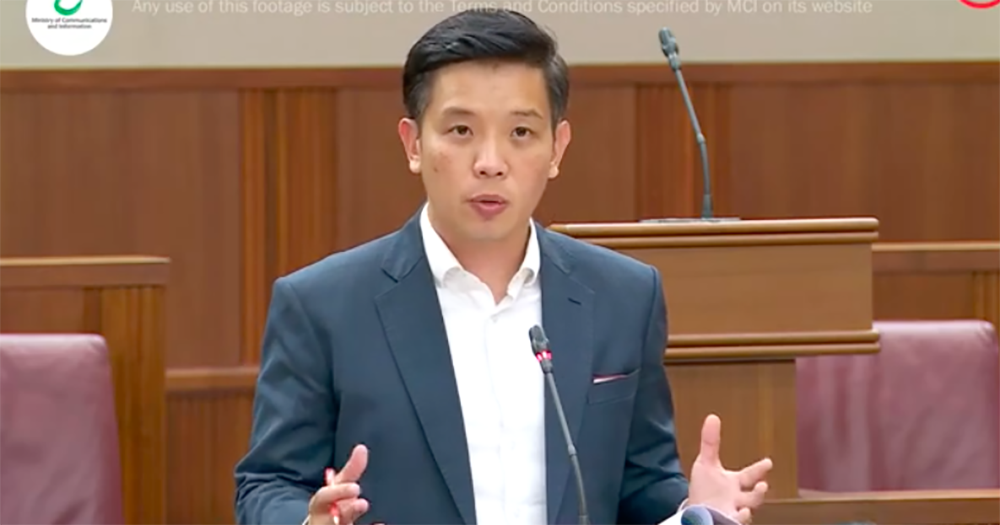Follow us on Telegram for the latest updates: https://t.me/mothershipsg
Private property purchases by foreigners have been "relatively low" at 4 per cent over the past three years, Minister of State for Trade and Industry Alvin Tan told Parliament on May 10, 2023.
Family offices in Singapore also have "virtually" no impact on the private housing market, as there was no residential property transaction attributable to these offices over the last six years,
Tan, who sits on the board of directors of the Monetary Authority of Singapore (MAS), was responding to several questions posed by Sengkang GRC MP Louis Chua of the Workers' Party and Non-Constituency MP Leong Mun Wai of the Progress Singapore Party.
They asked about foreign wealth inflow and family offices, including asking for statistics and their impact on Singapore, such as their effects on the private property market and whether they contribute to inflation.
Family offices are described as advisory firms that manage the finances or investments of an affluent individual or family.
According to government estimates, Singapore's family offices have increased from 400 in end-2020 to around 700 by end-2022.
Assets under management of foreign non-retail individual clients increased by S$470 billion from 2017 to 2021
Tan clarified that MAS does not have comprehensive data on foreign capital inflows into Singapore via family offices as such detailed data is not necessary for MAS to ensure macroeconomic and financial stability.
However, he noted that MAS keeps track of investments made by "non-retail individual clients", which includes family offices, clients of external asset managers, private trusts, and high-net-worth individuals, under an annual Asset Management survey.
Tan stated that based on the survey, the assets under the management of foreign non-retail individual clients, managed by financial institutions, increased by around S$470 billion from 2017 to 2021.
This makes up about 20 per cent of the increase in the total number of assets under management during the same period, he added.
He pointed out that the growth of assets from high-end individual clients has also been broadly similar to that of overall assets.
Tan explained that this means while there had been a pickup of funds flowing into Singapore's wealth management industry, it is not peculiar to high-end individual clients.
Breakdown of foreign fund inflows is by region rather than country
Tan noted that non-retail individual clients come from a "wide range of places." The most "granular breakdown" of the foreign source of funds is available by regions rather than specific countries.
Tan explained that this is no different from surveys published by financial sector authorities or industry associations in major wealth management centres like London, Hong Kong and Switzerland.
On the other hand, for the increase in assets under management for high-end individual investors, Tan said the top source region is Asia-Pacific, followed by Europe and then the Americas.
Funds inflow do not contribute to inflation
Tan added that inflation has little to do with an inflow of foreign funds into Singapore.
He explained that the increase in core inflation since 2021 was primarily due to the "sharp" increases in global energy, important food prices and stronger domestic wage growth. Core inflation does not take into account private transport and accommodation costs, which tend to be more volatile.
Such increases in costs "fed through" to higher prices for electricity, food, gas and essential services and accounted for nearly 75 per cent of core inflation, according to the Monetary Authority of Singapore (MAS), in 2022.
Family offices manage about S$90 billion worth of assets, less than 2 per cent of all assets managed
Tan pointed out that single-family offices that have applied for and been granted tax incentives by MAS manage about S$90 billion in assets as of 2021.
He added that this is less than 2 per cent of the S$5.4 trillion total assets managed in Singapore as of 2021,
"In short, the bulk of the increase in AUM (assets under management) in Singapore is attributable to institutional investors. Non-retail individual clients account for a small proportion and family offices even less."
In addition, most of the funds managed in Singapore are invested in assets outside the country.
"Hence, they typically remain in foreign currencies," he said.
Tan reiterated that they have little or no effect on the Singapore Dollar exchange rate or the official foreign reserves. MAS addresses appreciation pressures regardless of the source of funds as part of its regular market operations.
Assets managed in Singapore might not be invested in Singapore
Tan reiterated that while entities in Singapore manage assets, most of these assets are invested outside of Singapore.
He explained that the situation is "understandable as the investment universe is much larger outside of Singapore", and these investors use Singapore as a financial centre to access investment opportunities in our region and beyond our region.
Tan pointed out that as these assets are managed in Singapore, they help to create jobs and add value to the country's financial industry.
He also highlighted that there are positive spillovers to other sectors as these investors often appoint tax and legal professionals for wealth planning and operational matters.
"So it benefits our financial industry and beyond," he said.
Related stories:
Top screenshot via MCI/YouTube
If you like what you read, follow us on Facebook, Instagram, Twitter and Telegram to get the latest updates.
